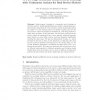Free Online Productivity Tools
i2Speak
i2Symbol
i2OCR
iTex2Img
iWeb2Print
iWeb2Shot
i2Type
iPdf2Split
iPdf2Merge
i2Bopomofo
i2Arabic
i2Style
i2Image
i2PDF
iLatex2Rtf
Sci2ools
102
click to vote
MICAI
2009
Springer
2009
Springer
A Two-Stage Relational Reinforcement Learning with Continuous Actions for Real Service Robots
Reinforcement Learning is a commonly used technique in robotics, however, traditional algorithms are unable to handle large amounts of data coming from the robot’s sensors, require long training times, are unable to re-use learned policies on similar domains, and use discrete actions. This work introduces TS-RRLCA, a two stage method to tackle these problems. In the first stage, low-level data coming from the robot’s sensors is transformed into a more natural, relational representation based on rooms, walls, corners, doors and obstacles, significantly reducing the state space. We also use Behavioural Cloning, i.e., traces provided by the user to learn, in few iterations, a relational policy that can be re-used in different environments. In the second stage, we use Locally Weighted Regression to transform the initial policy into a continuous actions policy. We tested our approach with a real service robot on different environments for different navigation and following tasks. R...
Artificial Intelligence | Different Environments | MICAI 2009 | Reinforcement Learning | Robot’s Sensors |
Related Content
| Added | 27 May 2010 |
| Updated | 27 May 2010 |
| Type | Conference |
| Year | 2009 |
| Where | MICAI |
| Authors | Julio H. Zaragoza, Eduardo F. Morales |
Comments (0)

